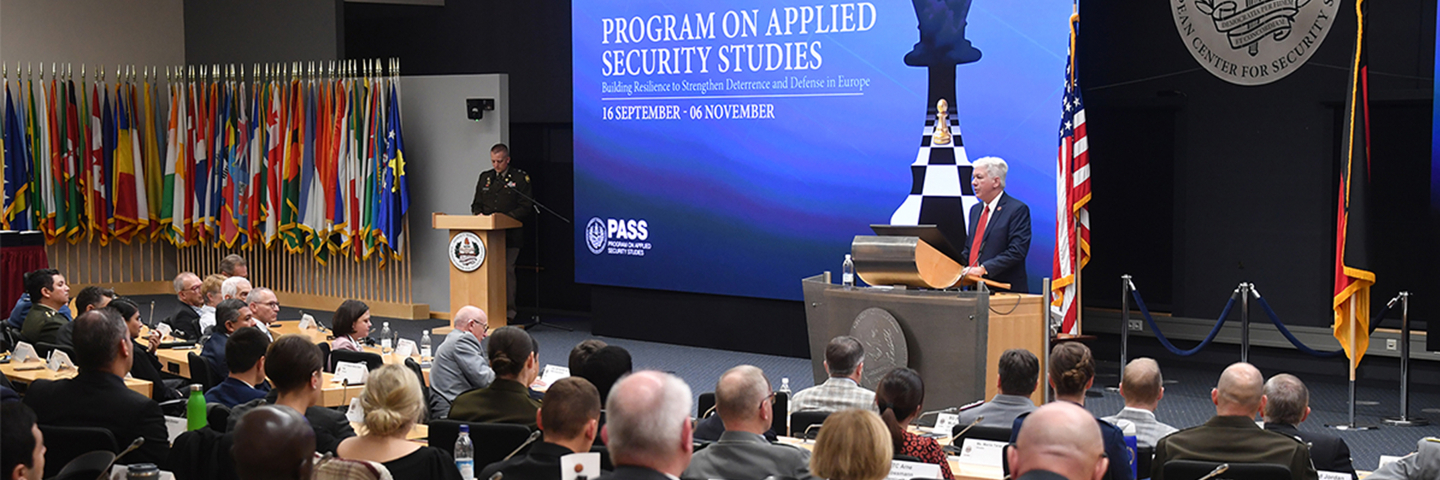
Security Studies Program Graduates 80+, Boosts Alumni Network Over 17,000
GARMISCH-PARTENKIRCHEN, Germany -- The Marshall Center capped its 2025 academic year, graduating more than 80 security professionals from the Program on Applied Security Studies on Nov. 6, 2025. The final course of the year also marked the Marshall Center achievement of reaching 17,000 alumni.
PASS is a foundational course for civilian government officials, military, academics and experts, and security practitioners to assess the current threat environment, align policies among allies and partners, and advance actionable outcomes to achieve peace through strength.
“We brought together participants from more than 50 countries, from different levels of professional experience,” said German Col. Konrad Lau, course director. “They trained together on how to handle crises, and they will always remain able to call a friend, a colleague, somebody in the network, because no nation alone will handle future challenges.”
A foundational course within the Marshall Center’s 2025 curriculum, PASS followed a three-phase structure that connected security practitioners with expert insights and practical exercises to strengthen defense institutions in their home nations.
In the first phase, the focus was on understanding resilience, identifying defense capability gaps, and analyzing vulnerabilities of European states and societies to internal and external threats, particularly those posed by China and Russia.
“We dedicated these four weeks to assessing vulnerabilities and capability gaps in Europe … including military capabilities, but also mindset, legal frameworks, institutional procedures, finance, and production lines, which many European countries are now lacking,” said Yevgeniya Gaber, Ph.D., Marshall Center professor of regional security studies and PASS academic advisor.
“Armed forces can win battles, but it is the nations who win wars,” Gaber continued. “The mindset, the mobilization of society, the understanding of the level of threats, and the willpower to defend your country and build peace through strength are of crucial importance.”
In the electives phase, the onus was on course participants to apply what they learned to analyze capability gaps. Working in small teams with subject matter experts, participants had the opportunity to examine selected security issues in detail.
The final phase focused on turning lessons from a practical exercise into strategy considerations, giving participants the chance to practice crisis management and advance actionable outcomes and policy recommendations.
“What we discuss here is not abstract theory - it’s the reality of how nations cooperate, compete, and survive,” Gaber said. “Our aim is to prepare professionals who can make informed decisions in that environment.”

After eight weeks of intense study and collaboration, the Marshall Center proudly recognized the newly graduated participants, now better prepared to assume positions of greater responsibility in their governments, security services, and institutions.
“This course is designed to shape you, future leaders,” said Barre Seguin, Marshall Center director, during graduation remarks. “Over these eight weeks you’ve built not only knowledge, and skills, but also a strong professional network rooted in common purpose and shared values.”
With the conclusion of PASS 2025, the Marshall Center is renewing its focus on a revamped 2026 program plan beginning in January with the Strategic Competition and Russia resident course, and a slate of additional offerings, workshops and dialogues to be announced soon.
As a trusted and well-positioned U.S.–German venue, the Marshall Center’s new program plan will equip allies and partners to share the burden, build institutions, and fight as one by turning allied and partner-nation commitments into capabilities for European-led security.
To learn more about 2026 course offerings, visit the Resident Courses page.